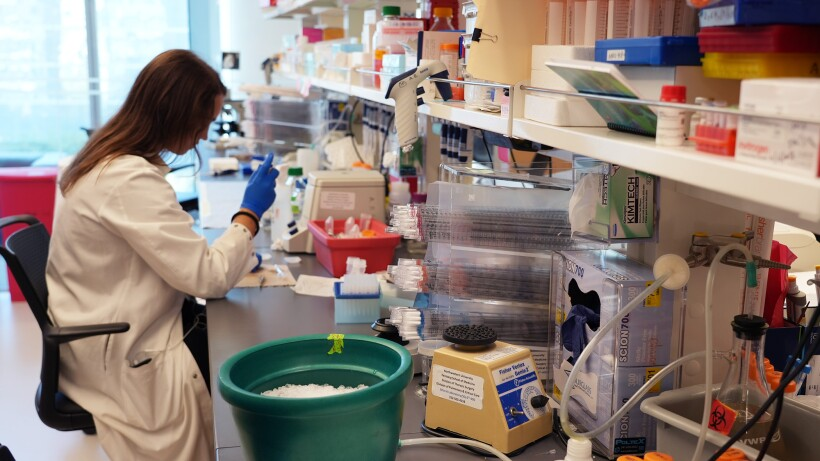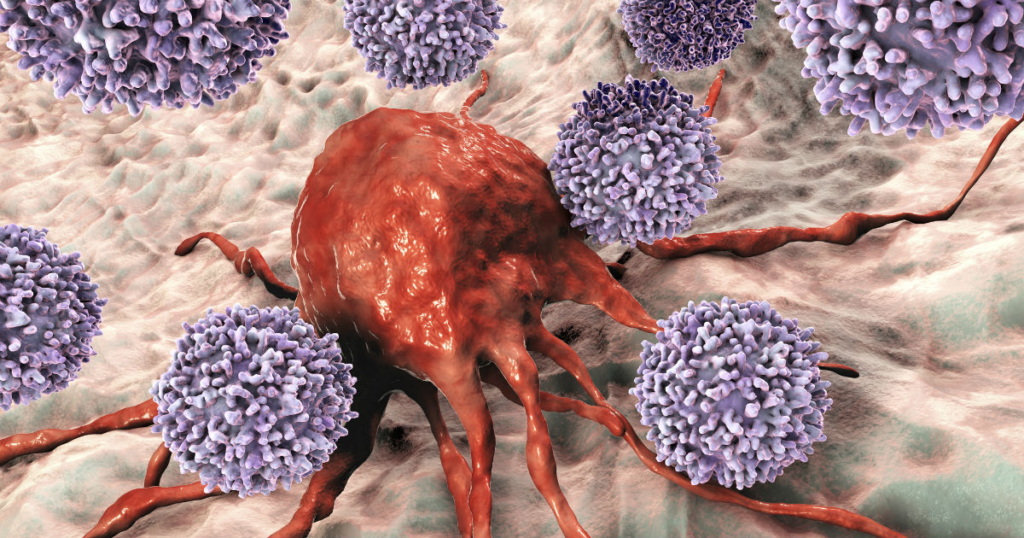The Covid-19 pandemic, which has left an indelible mark on the world, may unexpectedly provide a silver lining for cancer treatment. A recent study conducted at Northwestern Medicine has uncovered that the virus responsible for Covid-19 might have the capacity to shrink cancerous tumors.
A groundbreaking discovery suggests that the virus behind the global pandemic may have an unexpected ability to fight cancer, offering hope for new treatment options.
This surprising revelation opens up new possibilities in oncology, potentially revolutionizing how aggressive cancers are treated.
The Immune System’s Role in Fighting Cancer
The human immune system is designed to detect and eliminate threats, including cancer cells. However, cancer has developed intricate methods to evade immune detection. Monocytes, a type of immune cell, play a pivotal role in this process.
While monocytes typically help alert the immune system to foreign invaders, cancer cells can manipulate them to create a protective barrier around tumors. This barrier enables tumors to grow undetected and unchecked by the body’s natural defenses.
The study revealed that when SARS-CoV-2, the virus causing Covid-19, enters the body, it disrupts this shielding effect. The virus’s presence reprograms monocytes, enabling them to rally other immune cells to attack cancer cells effectively.
This disruption allows the immune system to identify and target tumors with greater precision. Such findings suggest that the immune system’s heightened response to Covid-19 can also extend to combating malignancies.
Read : COVID-19 First Wave Increased Heart Attack Risk for Up to 3 Years Among Unvaccinated People
Dr. Ankit Bharat, chief of thoracic surgery at Northwestern University, was among the first to notice this phenomenon during the pandemic. He observed that some cancer patients who contracted severe Covid-19 exhibited either tumor shrinkage or a slowing of tumor growth.
Read : Covid-19 Still Kills 1,700 a Week Around the World: WHO
Driven by curiosity, his team embarked on a detailed investigation to determine whether the virus’s interaction with the immune system could be leveraged to fight cancer.
Cancer-Fighting Immune Cells Triggered by Covid-19
One of the most remarkable findings of the study was the discovery of a unique type of immune cell activated by Covid-19. Unlike traditional immune cells that often face resistance from cancer, these specialized cells—triggered by the RNA of SARS-CoV-2—demonstrated extraordinary cancer-fighting capabilities.
These cells, known for summoning natural killer (NK) cells, can penetrate tumors and destroy cancerous tissue. NK cells are exceptionally potent immune agents, capable of targeting and eliminating cancer cells more effectively than T cells used in standard immunotherapy.

What sets these newly activated cells apart is their ability to bypass common resistance mechanisms employed by cancer cells. In traditional treatments like immunotherapy, cancer often mutates to evade detection, rendering the treatment less effective. However, the immune cells activated by Covid-19’s RNA are impervious to such resistance.
Dr. Bharat expressed his astonishment at the findings, stating, “It’s incredible, and a big surprise, that the same infection that caused so much devastation can help create a cancer-fighting cell.” These cells represent a promising avenue for treating aggressive cancers such as melanoma, lung, breast, and colon cancers.
Towards New Cancer Therapies Inspired by Covid-19
The implications of this discovery are vast. Researchers believe that the immune response triggered by SARS-CoV-2 could be replicated in drug form, offering a novel therapy for cancer patients. Such a treatment could work alongside existing methods, like chemotherapy and immunotherapy, or serve as an alternative in cases where other therapies fail.
Immunotherapy has been a game-changer in oncology, using T cells to fight cancer. However, its limitations include the potential for cancer cells to adapt and resist treatment. The immune response activated by Covid-19 could overcome these challenges by engaging NK cells, which are more effective at targeting and destroying resilient cancer cells.
Notably, this unique immune response appears to be exclusive to Covid-19’s RNA virus. Other RNA viruses, such as influenza, do not produce the same effect. This specificity offers researchers a focused path to explore how SARS-CoV-2’s mechanisms can be harnessed for therapeutic purposes.

Dr. Bharat and his team are optimistic about the potential of these findings to transform cancer treatment. The next step involves clinical trials to test the efficacy of this approach in human patients. If successful, the treatment could become a critical tool in the fight against cancer, particularly for patients with advanced or resistant forms of the disease.
A Hopeful Path Forward
While the Covid-19 pandemic has caused untold suffering, its role in reshaping cancer treatment could mark a turning point in medicine. The possibility of harnessing the virus’s unique interaction with the immune system provides hope for patients battling aggressive cancers. By converting devastation into innovation, researchers are opening doors to possibilities that were previously unimaginable.
This discovery does not mean that Covid-19 itself will become a standard treatment for cancer. Instead, it paves the way for therapies that mimic its effects, offering a safer and more controlled approach to leveraging its immune-modulating properties. For many cancer patients, especially those who have exhausted traditional treatment options, this research represents a beacon of hope.
As clinical trials begin, the medical community awaits the results with anticipation. If these trials confirm the efficacy of SARS-CoV-2-activated immune cells in combating cancer, it could usher in a new era of oncology, one in which even the most formidable cancers can be fought with renewed vigor.
The journey from discovery to application is still in its early stages, but the potential is undeniable. By transforming an agent of destruction into a tool for healing, this research exemplifies the resilience and ingenuity of scientific progress.

